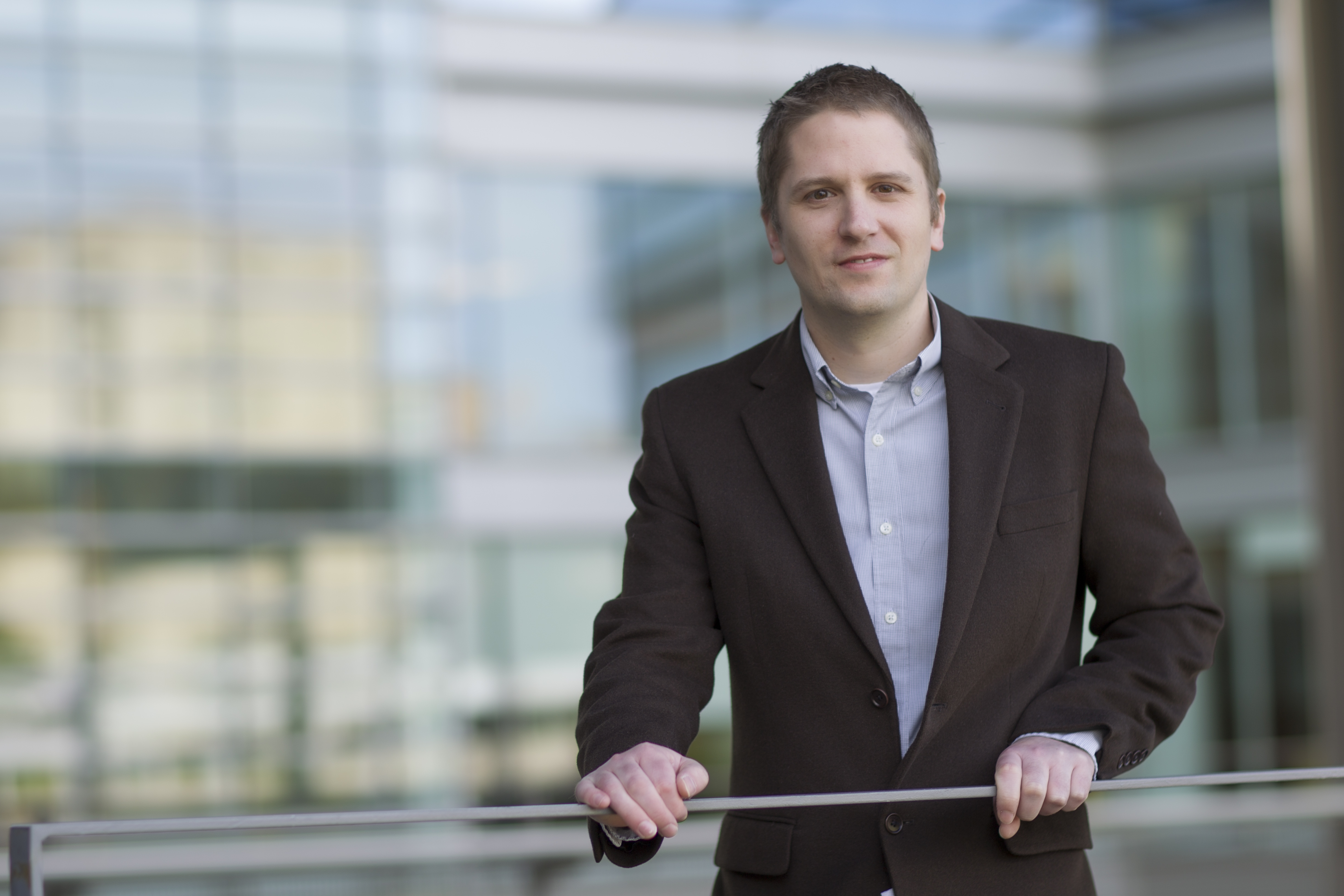UNC Lineberger researcher Ben Major, PhD, an assistant professor in the UNC School of Medicine Department of Cell Biology and Physiology, studies cell signaling pathways in normal and cancerous cells. He hopes that a finding made by his team earlier this year could lead to a new treatment for a typically fast-growing type of lymphoma.

It’s the thrill of discovery that drives Ben Major. A researcher at the UNC Lineberger Comprehensive Cancer Center, Major is studying the differences in how normal and cancer cells sense and interpret information using signals. By understanding how cancer cells respond to their environment, he hopes that he and his team might reveal new cancer treatment approaches.
“My biggest motivator is the thrill that comes with discovering something that no one knows, and the idea that that discovery could lead to a new treatment or could be used to help predict patients’ prognosis,” said Major, PhD, a UNC Linebeger member and an assistant professor in the UNC School of Medicine Department of Cell Biology and Physiology. “It’s just that adrenaline rush when you find something so outstandingly cool, and you see that that finding could help people.”
Earlier this year, Major led a team to discover what he hopes will translate into a new treatment for a typically fast-growing type of lymphoma. In a pre-clinical study published in the journal Science Signaling earlier this year, he and collaborators showed that they could slow the growth of diffuse large B-cell lymphoma, a type of cancer that affects certain white blood cells.
In the study, the researchers were able to impair lymphoma growth using a type of experimental drug called a Wnt inhibitor, which works by blocking a cell signaling pathway called the Wnt pathway. In particular, they were able to slow cancer growth in mice that had high expression of a gene called FOXP1. Overexpression of that gene strongly correlates with a poorer prognosis for patients with diffuse large B-cell lymphoma, Major said, as well as a decreased response to current therapy. Until their study, the question of why FOXP1 overexpression in lymphoma was bad for patients was not clear.
“With respect to cancer, I think it’s becoming very clear that FOXP1 is overexpressed, and when that happens, it’s bad,” he said. “And in lymphoma, we’re arguing that FOXP1 activates Wnt signaling, and that this drives the poor patient outcome.”
The finding is the first step toward the possibility of using a Wnt inhibitor drug for diffuse, large B-cell lymphoma, Major said. Already, the investigational inhibitor tested in their study is in early clinical trials for the treatment of other diseases. Major plans to continue his research with the support of a three-year, $225,000 grant from the Gabrielle’s Angel Foundation.
While his interest in science started when he was a child, he said his path into research happened almost by accident. As an undergraduate at Michigan State University, he loved science, but he wasn’t sure of his career path. He started working in a laboratory in a support role, washing dishes and doing other work. He was hooked.
“I just loved it – to the point that the possibility of going to medical school was out, and I knew I wanted to go to graduate school,” he said.
It was at the University of Utah Huntsman Cancer Institute that he began studying cell signaling, and it was at the University of Washington as a postdoctoral fellow that he started studying Wnt signaling in particular. He found that there’s a lot to learn about cell signaling.
“I find it intriguing how cells sense and interpret information, and how they translate that information into an action,” he said. “I’m interested in how they do this normally, and how in different stages of disease development, that response is altered or perturbed.”
In choosing to come to UNC, he found a setting with the potential for great collaborative research and a good atmosphere for his family. The 39-year-old is a father of three.
He believes that his basic science approach to research really has the potential to help patients.
“Much of our work points to very critical nodes within these signaling pathways that we can potentially drug in order to help patients,” he said. “And without that basic science knowledge, you’re just blindly screening compounds.”
In addition to Major, the other co-authors on the Science Signaling paper included: Matthew P. Walker, a postdoctoral fellow in the UNC Department of Cell Biology and Physiology; Charles M. Stopford of UNC Lineberger and UNC School of Medicine Department of Microbiology and Immunology; Maria Cederlund of the Institute for Biochemistry and Molecular Biology at the University of Ulm in Germany; Fang Fang, PhD, a postdoctoral fellow the Carolina Center for Genome Sciences and UNC Department of Genetics; Christpoher Jahn of the Institute for Biochemistry and Molecular Biology; Alex D. Rabinowitz of the UNC Department of Cell Biology and Physiology; Dennis Goldfarb of the UNC Department of Computer Science; David M. Graham of the UNC Department of Cell Biology and Physiology; Feng Yan, PhD, a postdoctoral fellow in the UNC Department of Cell Biology and Physiology; Allison M. Deal of the UNC Lineberger Biostatistics and Clinical Data Management Core; Yuri Fedoriw, MD, an associate professor in the UNC Department of Pathology and Laboratory Medicine; Kristy L. Richards, MD, PhD, an assistant professor in the UNC Department of Genetics; Ian J. Davis, MD, PhD, an associate professor at the UNC School of Medicine and a UNC Lineberger member; Gilbert Weidinger of the Institute for Biochemistry and Molecular Biology; and Blossom Damania, PhD, a professor in the Department of Microbiology and Immunology, assistant dean for research at the school a UNC Lineberger member.
